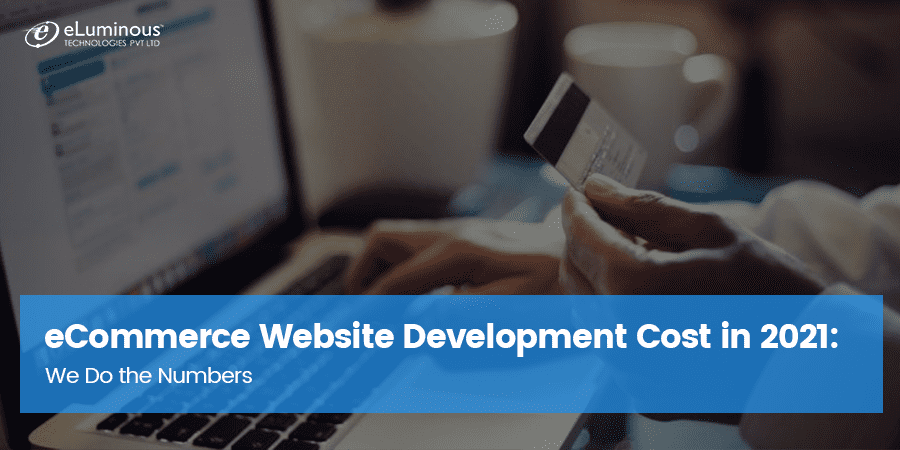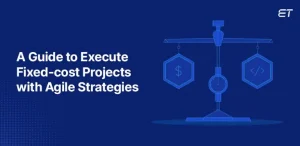Horses for courses.
That sums up the answer to how much does it cost to build an eCommerce website from scratch in 2021.
Wondering why?
The phrase is appropriate as the cost of building an eCommerce site today depends upon diverse factors. For starters, a thumb rule is to peg no more than 20% of your expected annual eCommerce sales for developing an online store.
But this rule becomes harder to adhere to if your eCommerce operation is looking at six-figure and higher in annual sales.
Similarly, platforms such as Shopify and WooCommerce have made it easier and cheaper to create an eCommerce site. However, they have their share of drawbacks and are not preferred by businesses that want full control of their online store management.
Which is why there’s no one right answer but multiple close answers.
Confused? Read on to know how much it costs to develop an eCommerce website today and what are the variables influencing it.
Which Factors Influence the Cost of Developing an eCommerce Website?
Much like a car, an eCommerce website is a coming together of several components. And just like how a car’s final price is influenced by the powertrain and feature options you choose, so does your eCommerce website’s cost depend upon the following factors:
- Your Target Audience: Will your online store target B2B or B2C customers?
- Complexity: Do you want a simple, basic eCommerce website or one with lots of webpages and interactivity?
- Functionality: How many features you want for your store? More the features, the higher the final price.
- Third-Party Services: Do you want to integrate third-party services to make your eCommerce website even more functional and customer-friendly? If so, it’ll cost you more.
- Product Catalogue: How many product categories and products you want to sell via the eCommerce site?
- Platform or Custom Website: Will your online store use eCommerce platforms such as Shopify, WooCommerce, Magento or its own custom website?
- Web Hosting: What kind of web hosting do you need?
- Payment Gateway: Which and how many payment gateways you want to offer on the site?
- Vendor: Will you hire dedicated developer as a freelancer or from an experienced eCommerce website development company?
While this list of eCommerce website cost factors isn’t exhaustive, it covers most of the common questions you need to answer before working on your new eCommerce website.
Process and Cost of Building a Basic eCommerce Store
The cost of building an eCommerce store is a big concern for those starting-up or those who’ve decided to branch out their offline venture into the online world.
As such, our process and cost calculations below reflect the needs of such businesses by focusing on a basic eCommerce website for one platform.
What are the main features of such a basic eCommerce website?
- Email and Social Media Authorization – Enabling users to register/login to your store using their email or social media accounts.
- Categories and Products – Letting users browse your offerings through categories, sub-categories (if applicable), and products.
- Product Search – Allowing users to search for products, use filters like category and price range, and sort products by price, relevance etc.
- Product Page and Reviews – Helping users understand your product and read its reviews.
- Cart Management – Allowing users to add, remove, edit the number of products and redeem discount codes while the cost is calculated in the backend.
- Checkout and Payments – Enabling users to check out and make the payment using their preferred method (credit/debit card, PayPal, bank account, cryptocurrency etc).
- Purchase History – Letting users manage their purchase history and repeat a previous order.
- Wishlist – Allowing users to save, remove, and edit a product for later purchase.
- Website Analytics – Empowering you to track your store’s performance by integrating it with an analytics tool like Google Analytics.
Read more: What is Headless Commerce & How Can It Help Your ECommerce Business
Process of eCommerce Website Development
While the minutiae might differ with each custom web application development company, all the features outlined above are generally developed over a two-stage process that looks like this:
1) Discovery Stage – An eCommerce website development company can take between 3-6 weeks to complete this stage. Things accomplished in this period include:
- Market and competitor assessment
- Evaluation of your feature requirements
- Store’s UI/UX design
- Human and budgetary resource allocation
- Development stage planning
2) Development Stage – The discovery stage lays the foundation for the development stage, which can take up around 2-4 months and covers the following services:
- Website’s frontend and backend development
- Quality assurance and testing
- Project management
- Periodic team reviews
Based on the features and process outlined above, this is the eCommerce website development cost breakdown for each service.
| Service | Approximate Cost |
|---|---|
| UI/UX Design | $2500 |
| Website Frontend & Backend Development | $8000 |
| Quality Assurance & Testing | $1800 |
| Business Analysis (Developing functional specification document & product backlog) | $2,000 |
| Project Management | $3500 |
| Total Cost | $17,800 |
| Total Time | 3 – 5 Months |
Infrastructure and Recurring Costs in eCommerce Website Development
By now, you know the ballpark service cost for building a basic eCommerce store. However, you also need to account for infrastructure and recurring costs for the website. These include,
1) eCommerce Platform Costs
As mentioned previously, you can either go for a custom eCommerce website or use an eCommerce platform to reduce costs and complexity. That said, the trade-off for the lower price is lesser control over your website and lack of enough customization options. These platforms include,
- Shopify – Shopify is one of the fastest-growing eCommerce platforms and is often hailed as the WordPress of the eCommerce world for its role in making it easier for newcomers to sell online. On the downside, it’s limited in terms of features and customization options but you can somewhat make up for this disadvantage by choosing premium packages. And if you’d rather focus on running your business, factor in the cost to hire dedicated developer to build the site for you.
- WooCommerce – WooCommerce is one of the most popular eCommerce solutions built to convert any WordPress website into a full-fledged eCommerce portal. And though it’s free to sign-up for, you will have to fork out cash for the domain name, hosting, SSL, payment gateway, and hire dedicated developer for customization.
- Magento – Magento is a popular choice with enterprise eCommerce websites that require a rich set of features and high customization options. Brands using Magento website development include Ford, Liverpool, Sigma Beauty, and Nike. As for the cost of building a Magento eCommerce website, it ranges from $12,000 to $36,000.
Read more: Magento vs Shopify – Which one should you opt for Better Sales? (Part-1)
2) Domain Name
Your domain name is the identity of your eCommerce store, which means you have to ensure it aligns with your offerings and brand image. Buying such a domain can be costly, especially if you want one that uses a very specific and highly competitive term.
Moreover, you need to pay this price yearly, making this a recurring expense for your eCommerce business. In most cases though, this cost is reasonable as domain names sell for $10-20 per year.
3) Web Hosting
Web hosting is where your eCommerce website is hosted on the web. A reliable web hosting provider is a must to ensure your site performs well even under heavy visitor traffic and doesn’t suffer unexpected downtimes. To this effect, expect to pay between $10 to $100 per month depending upon the hosting plan you choose.
4) SSL Certificate – An acronym for Secure Socket Layers, SSL is an encryption certificate that assures a user that your eCommerce website is safe for them to share their payment details with. An SSL certificate usually costs between $10 to $100 per month, again depending upon the plan you choose.
5) eCommerce Website Maintenance Cost
The biggest chunk of recurring cost for your eCommerce website is maintenance. Your eCommerce website should be seen as a means to an end (greater sales or brand awareness) rather than the end itself.
This means it needs to be constantly updated with the latest bug fixes, security updates, and features to ensure a smooth user experience at all times. So, how much does it cost to maintain an eCommerce website annually?
While this depends upon your vendor, the maintenance cost of eCommerce websites ranges between $200 to $1,000 per month. As with previous estimates, this too is for a basic eCommerce website and depends upon factors such as existing functionality, the extent of updates required, number of bugs to be fixed etc.
Read more: B2B-B2C Hybrid eCommerce: Twice the Success, Half the Cost
Summing It Up
Building an eCommerce website can seem daunting. But in this pandemic-affected world, it can give your business a new avenue of sustainable sales growth. And while we’ve done our best to offer an estimate based on our experience as a web design and development company, the final price is influenced by several variables.
If you’re a new business or expect no more than five-figure annual sales from your online store, you may use the ‘20% of annual sales as eCommerce website development cost’ thumb rule mentioned at the beginning. But if you want an accurate picture of which horse is right for your course, get in touch with our eCommerce expert now.
Thank you for reading! If you liked this post, do subscribe to get informative posts about web and mobile development, data analytics, and eCommerce delivered to your inbox.
Digital Marketing Manager
Responsible for developing and managing web presence, Sarah has been associated with eLuminous Technologies for 7+ years. Strategic and innovative with a passion for Content Marketing and enhancing brand awareness. Administered all business marketing operations and advertisement campaigns that eventually increased web traffic. She works under the motto “Think like a Publisher, not a Marketer.”



